If you’re struggling with acne that just doesn’t seem to go away, it might not be your typical acne, it could be fungal acne. This type of acne is a bit different and needs special care. That’s where anti-fungal acne products come into play.
Now, you might be wondering, what exactly is fungal acne? Well, it’s not acne in the traditional sense. It’s caused by yeast (a type of fungus) that inflames the hair follicles on your skin and creates itchy and uniform pimples. The tricky part is that it looks a lot like regular acne, which is why it’s often misdiagnosed.
But the good part is that, once correctly identified, fungal acne can be effectively managed with the right products. Whether you’re just curious or seriously seeking a solution, this article aims to provide you with valuable information, tips, and product recommendations that can help you treat fungal acne.

Comprehensive List of Anti-Fungal Acne Products
1. Topical antifungals
When we talk about fighting fungal acne, topical antifungals are often the first line of defense. These are creams and gels that you apply directly to your skin. The most common ingredients in these products are ketoconazole and clotrimazole. Ketoconazole is a powerhouse in tackling the yeast that causes fungal acne. It’s gentle yet effective, making it a popular choice.
Clotrimazole works similarly, helping to reduce the yeast growth on your skin. Another ingredient to look out for is terbinafine. It’s typically used for fungal infections of the skin and nails, but it’s also effective against fungal acne. These topical treatments are user-friendly – just apply them to the affected areas according to the instructions, usually once or twice daily.
2. Anti-fungal shampoos
Now, let’s move to something you might not immediately associate with acne treatment – anti-fungal shampoos. These are particularly useful if you’re dealing with fungal acne on your scalp or forehead. Key ingredients here include ketoconazole, which we already know is great for tackling yeast, and selenium sulfide, another effective agent against fungal growth.
Another ingredient worth mentioning is ciclopirox olamine. It’s less commonly known but equally effective. These shampoos can be used a few times a week, depending on the severity of your condition, and they can really help in controlling and reducing fungal acne.
3. Oral antifungals
Sometimes, topical treatments might not be enough, especially in more severe cases of fungal acne. This is where oral antifungals come into play. Medications like fluconazole and itraconazole are prescribed for their efficiency in handling more persistent fungal infections. These are usually taken in pill form and work from the inside to combat the fungus.
Griseofulvin is another medication, often reserved for stubborn cases that don’t respond to other treatments. It’s important to remember that these are prescription medications, and you should only take them under the guidance of a healthcare professional who can monitor their effectiveness and any potential side effects.
4. Natural and alternative remedies
For those who prefer a more natural approach, there are several options. Natural remedies like tea tree oil have gained popularity for their antifungal and antibacterial properties. They can be found in various skincare products and are especially good for those with sensitive skin.
Apple cider vinegar is another natural alternative that can be used as a toner due to its antifungal properties. While these natural options can be effective, it’s important to note that they may work best as a complementary treatment alongside other anti-fungal products, especially for more severe cases.
5. Medicated cleansers
Medicated cleansers play a crucial role in the daily management of fungal acne. These cleansers typically contain antifungal agents like pyrithione zinc, which helps reduce fungus on the skin. Some cleansers also include salicylic acid, which can complement the antifungal treatment by helping to clear blocked pores.
Using these cleansers as part of your daily routine can help manage symptoms and prevent the recurrence of fungal acne. They’re usually gentle enough for daily use and can be a great addition to your skincare regimen.
6. Anti-fungal powders and sprays
Anti-fungal powders and sprays are particularly useful for treating areas of the body that are prone to sweating and moisture, such as the back, chest, and underarms. They are easy to apply and can be very effective in keeping the affected areas dry, reducing the likelihood of fungal growth.
These products are especially handy for active individuals or those living in hot and humid climates where fungal acne can be a frequent issue.

Conclusion
Skincare offers a variety of anti-fungal acne products, each designed to tackle those stubborn fungal acne issues. From topical creams and medicated shampoos to natural remedies and oral medications, there’s a solution for everyone. The key to success with these products lies not just in choosing the right one but also in using them correctly.
You should also be consistent with your treatment and understand how each product works best for your skin. With the correct usage, these anti-fungal acne products can be highly effective in clearing up your skin and preventing future outbreaks.
Source:
https://www.goodrx.com/conditions/fungal-infection/fungal-acne






